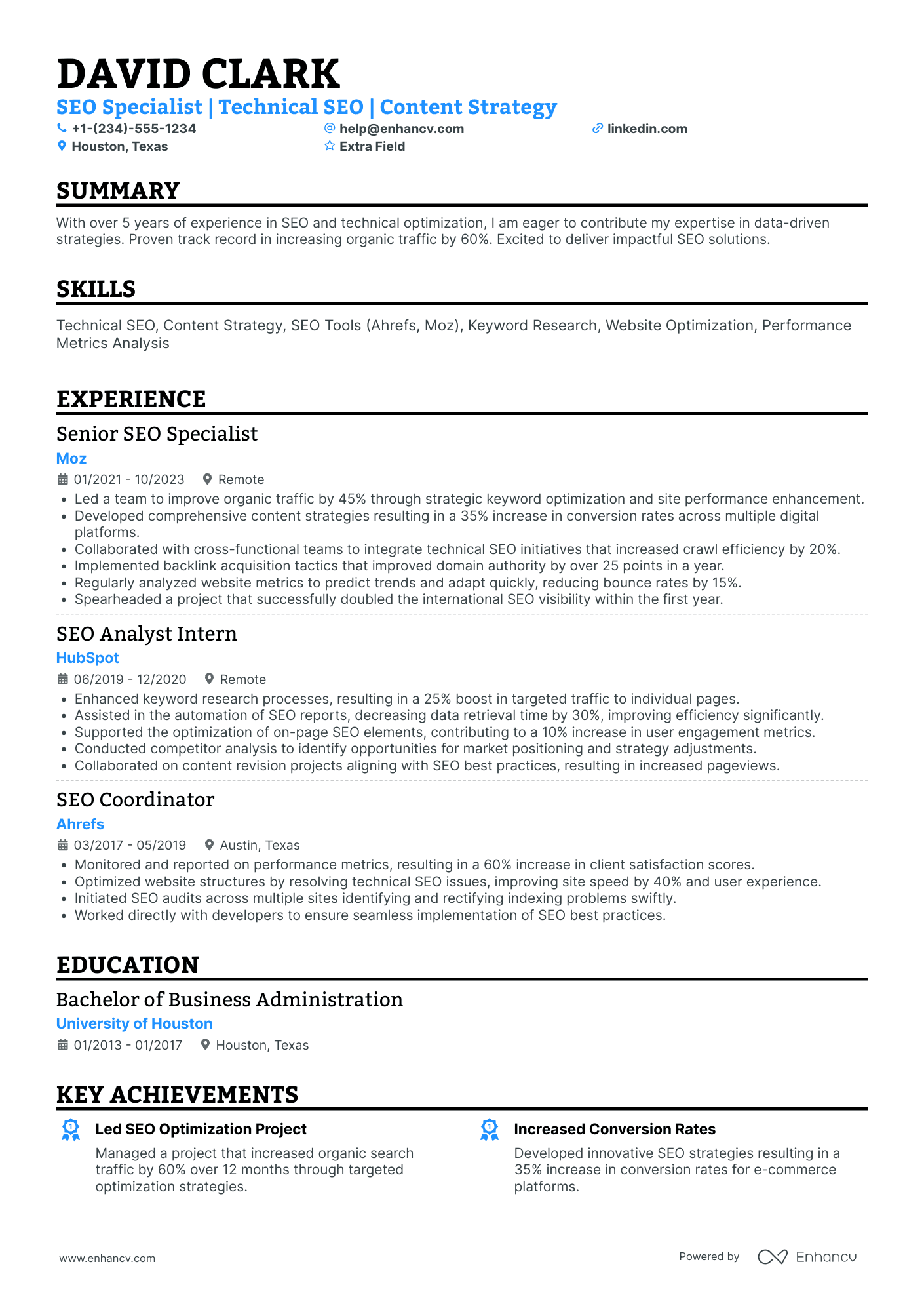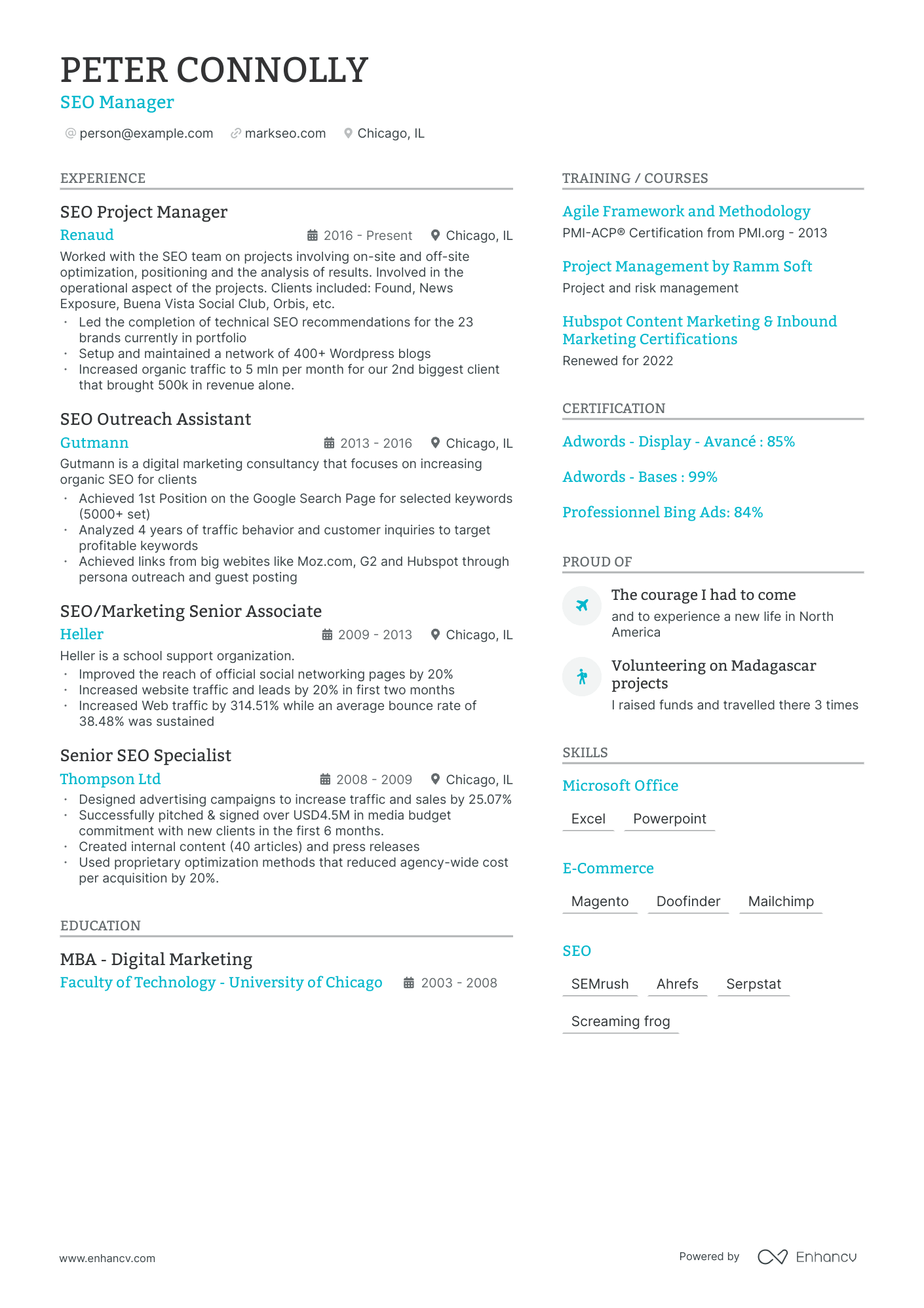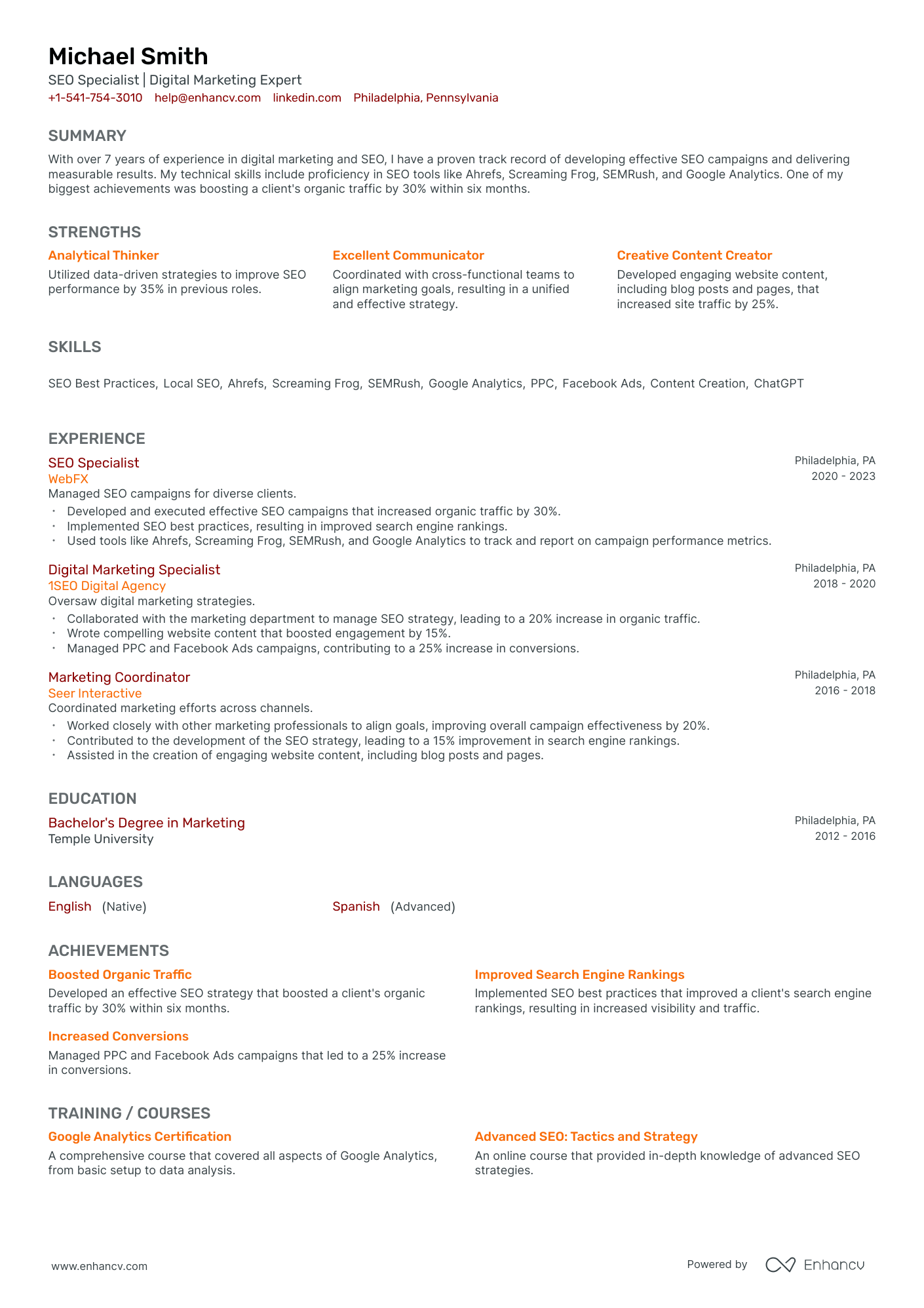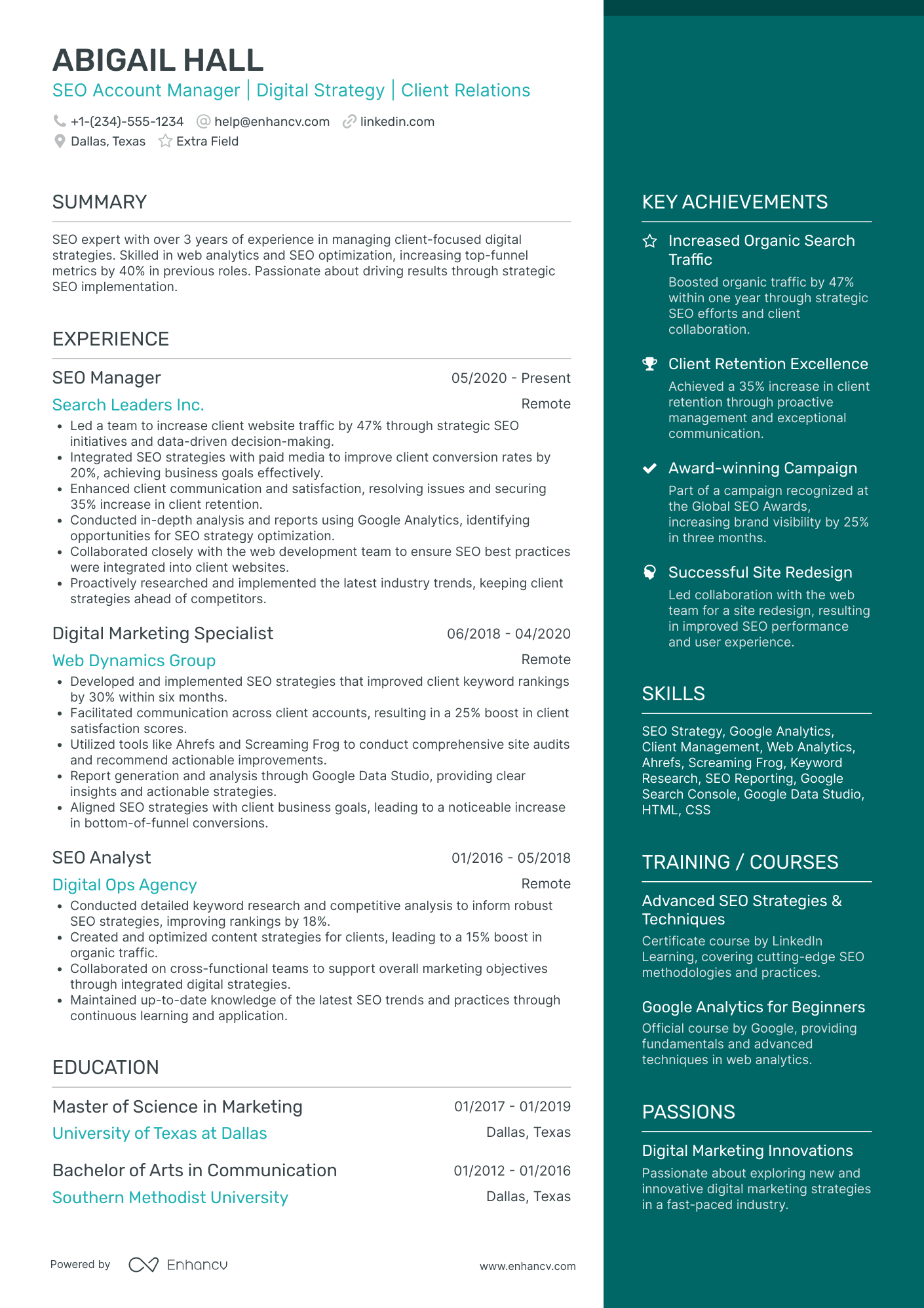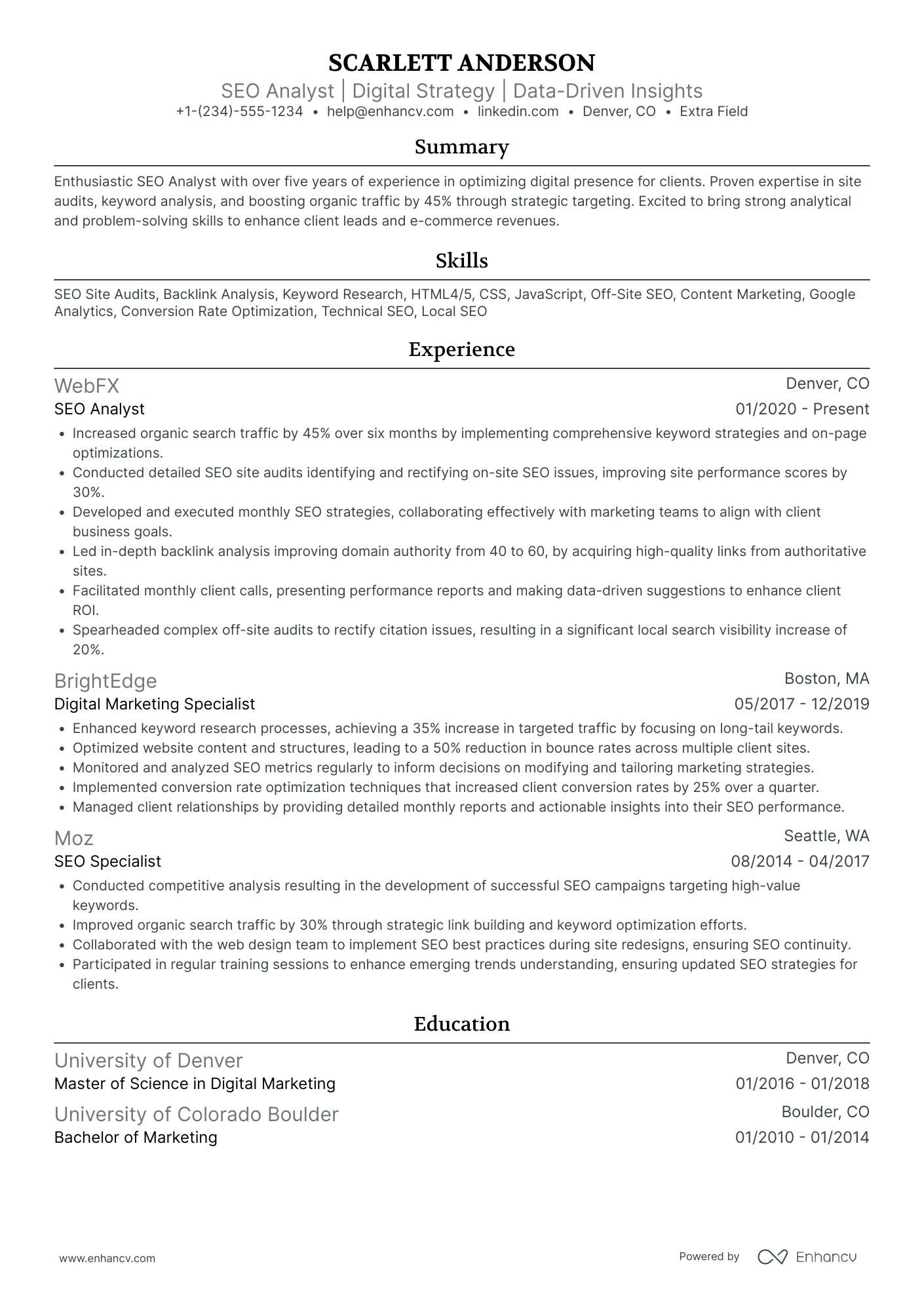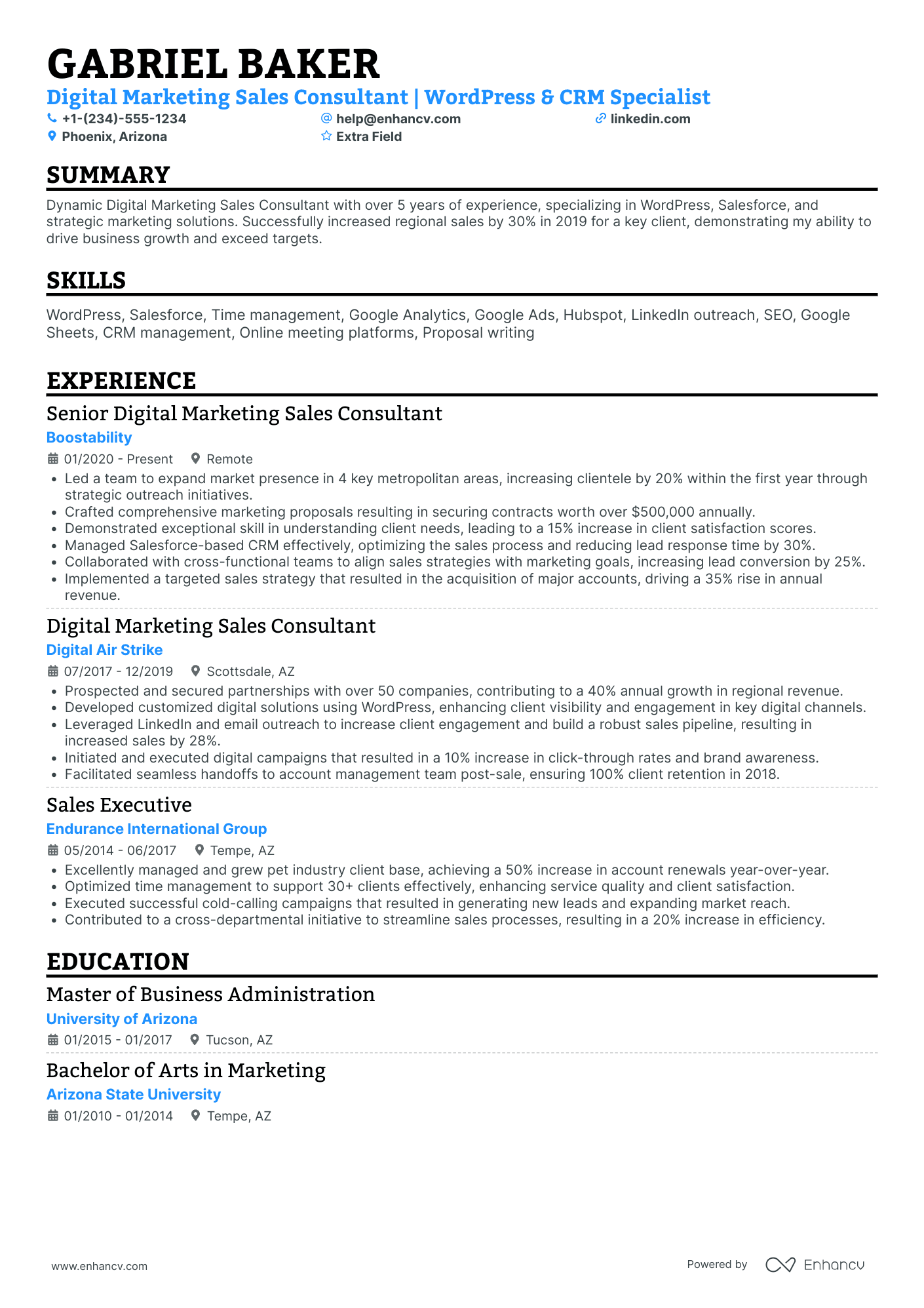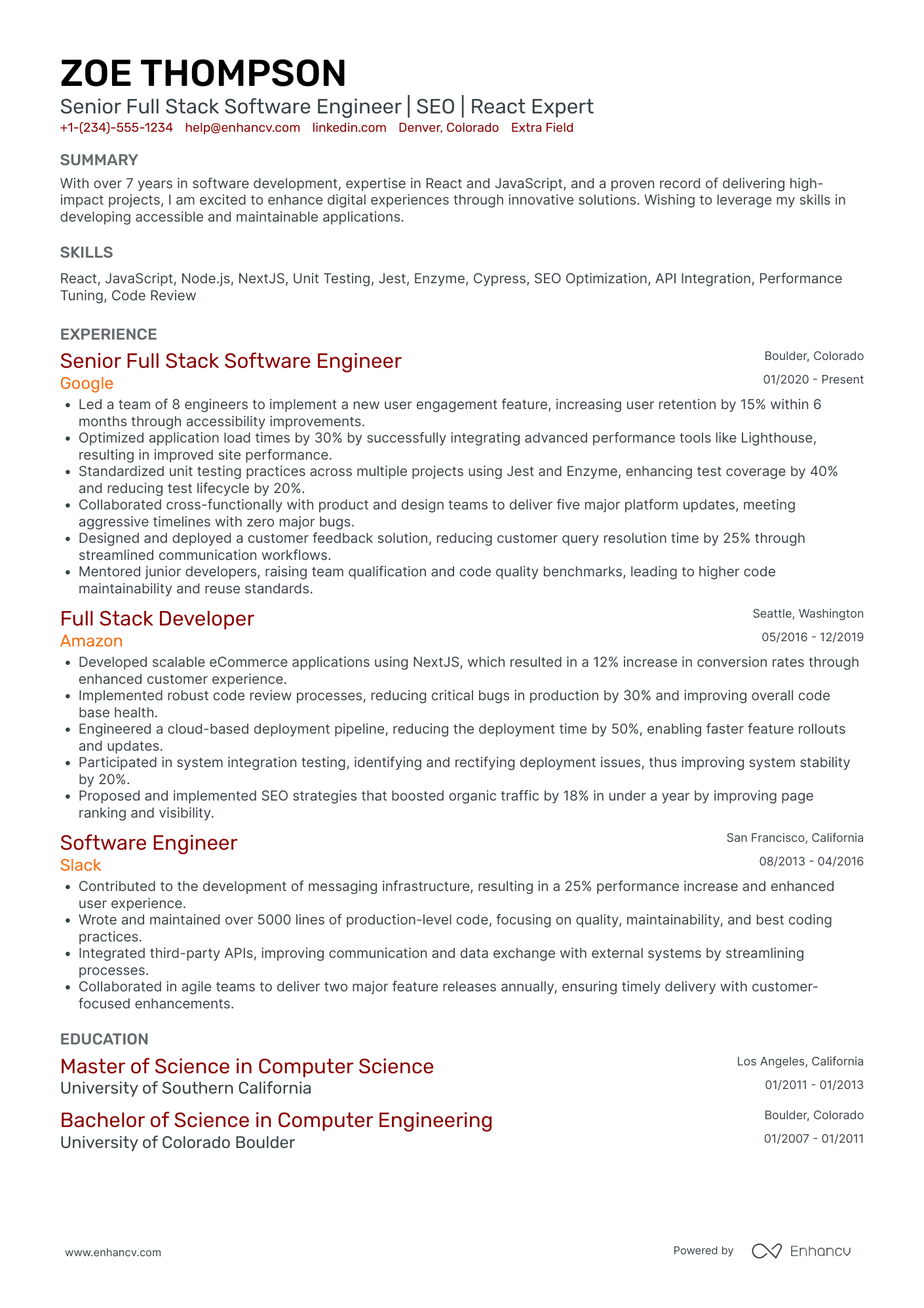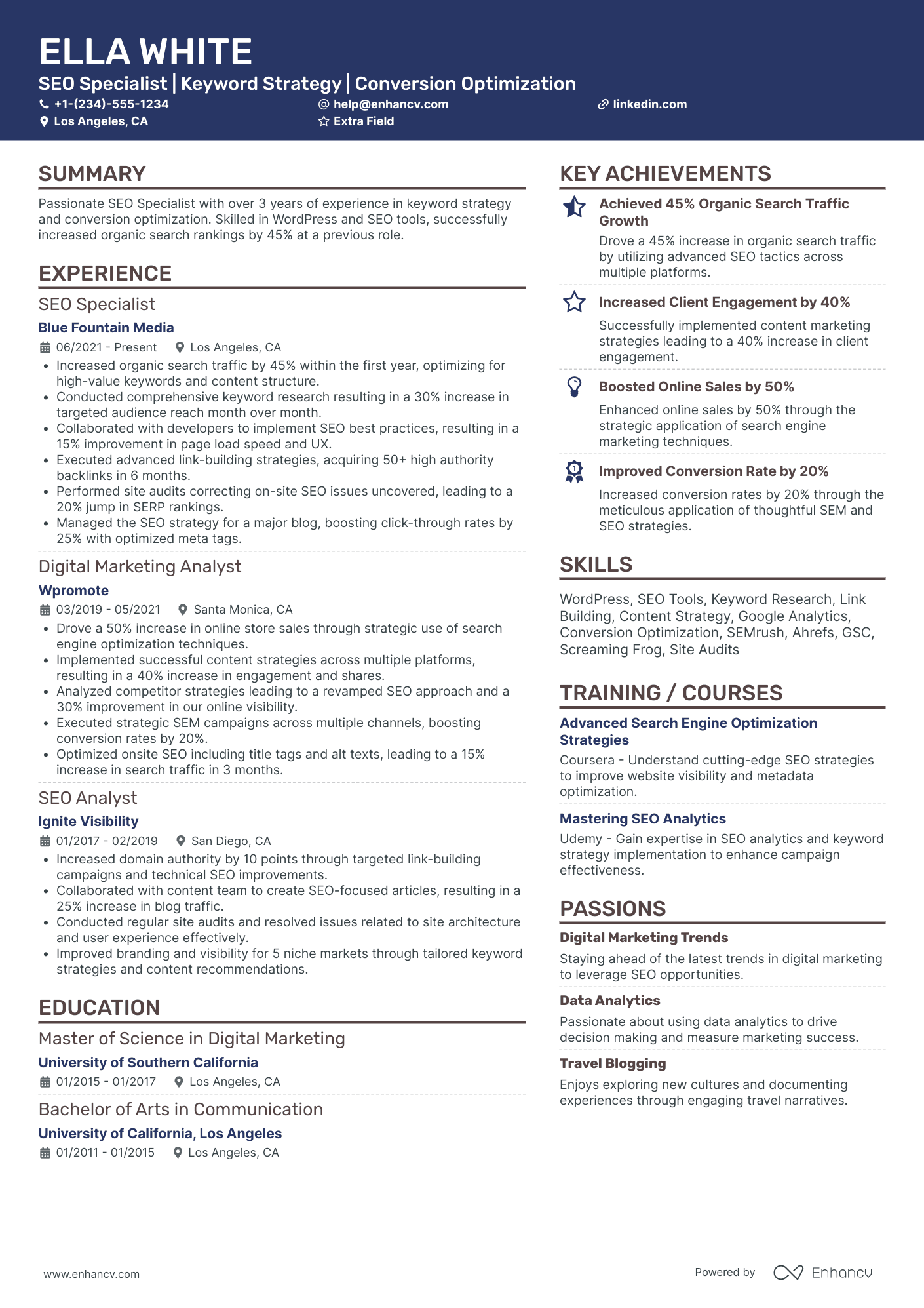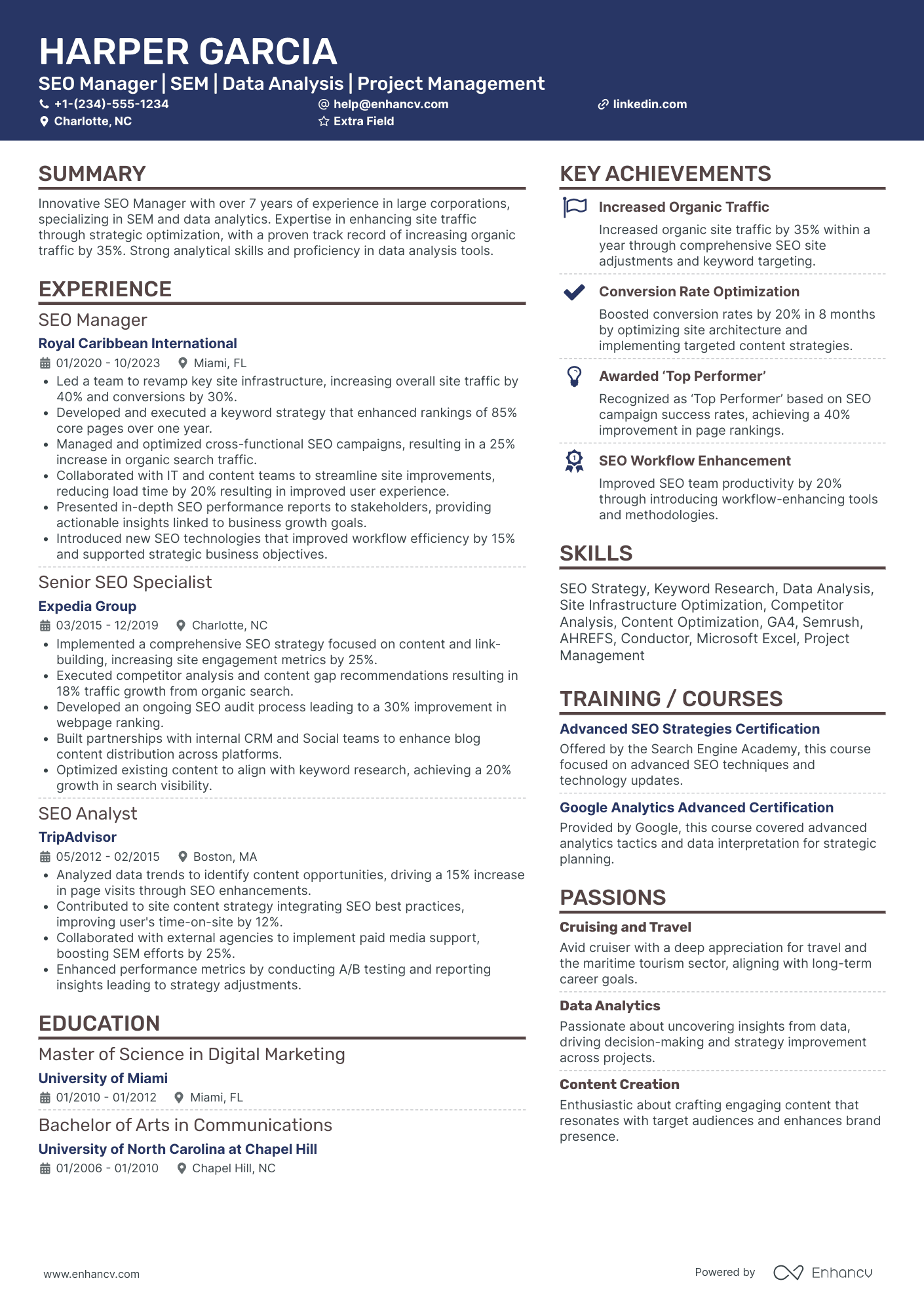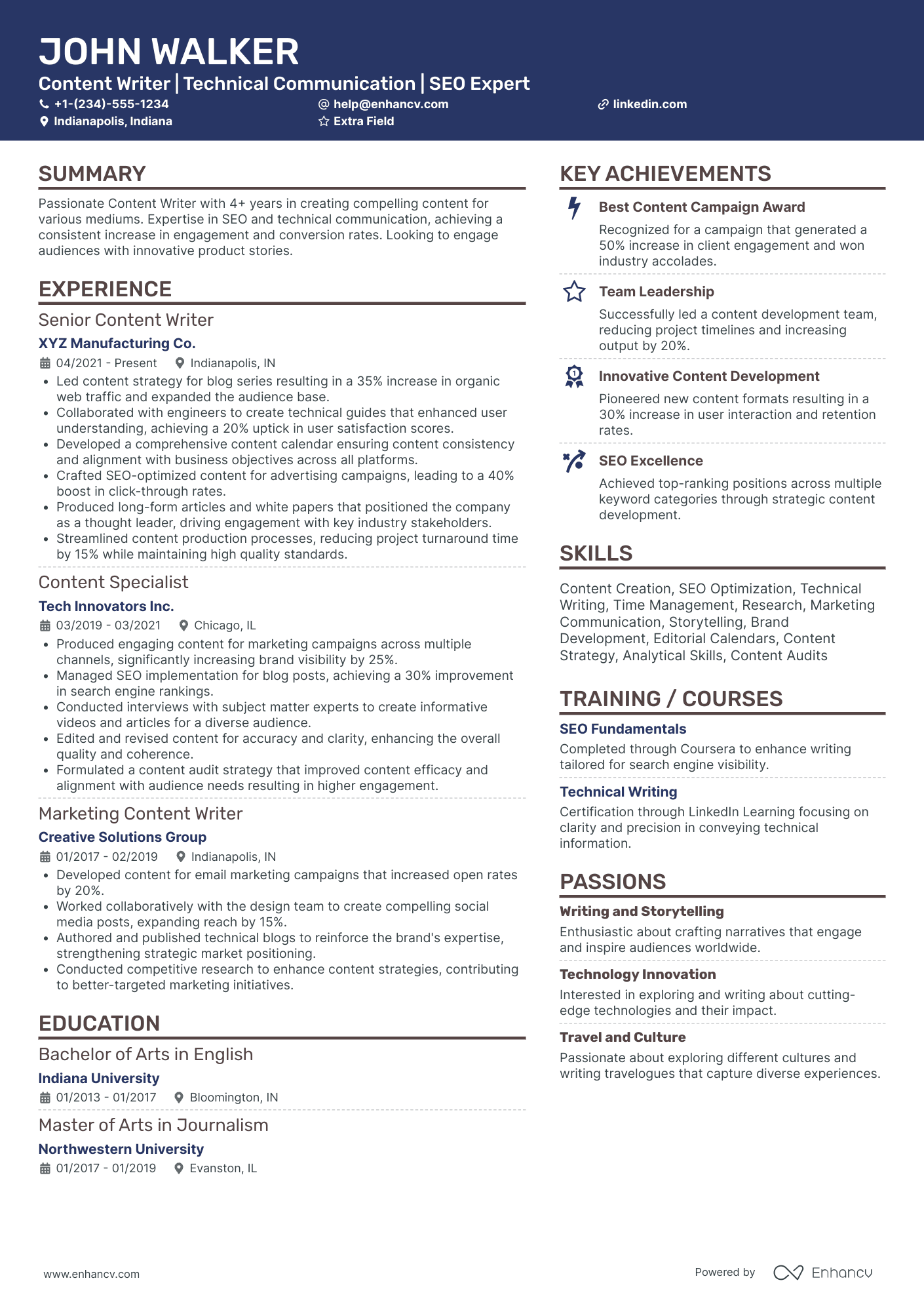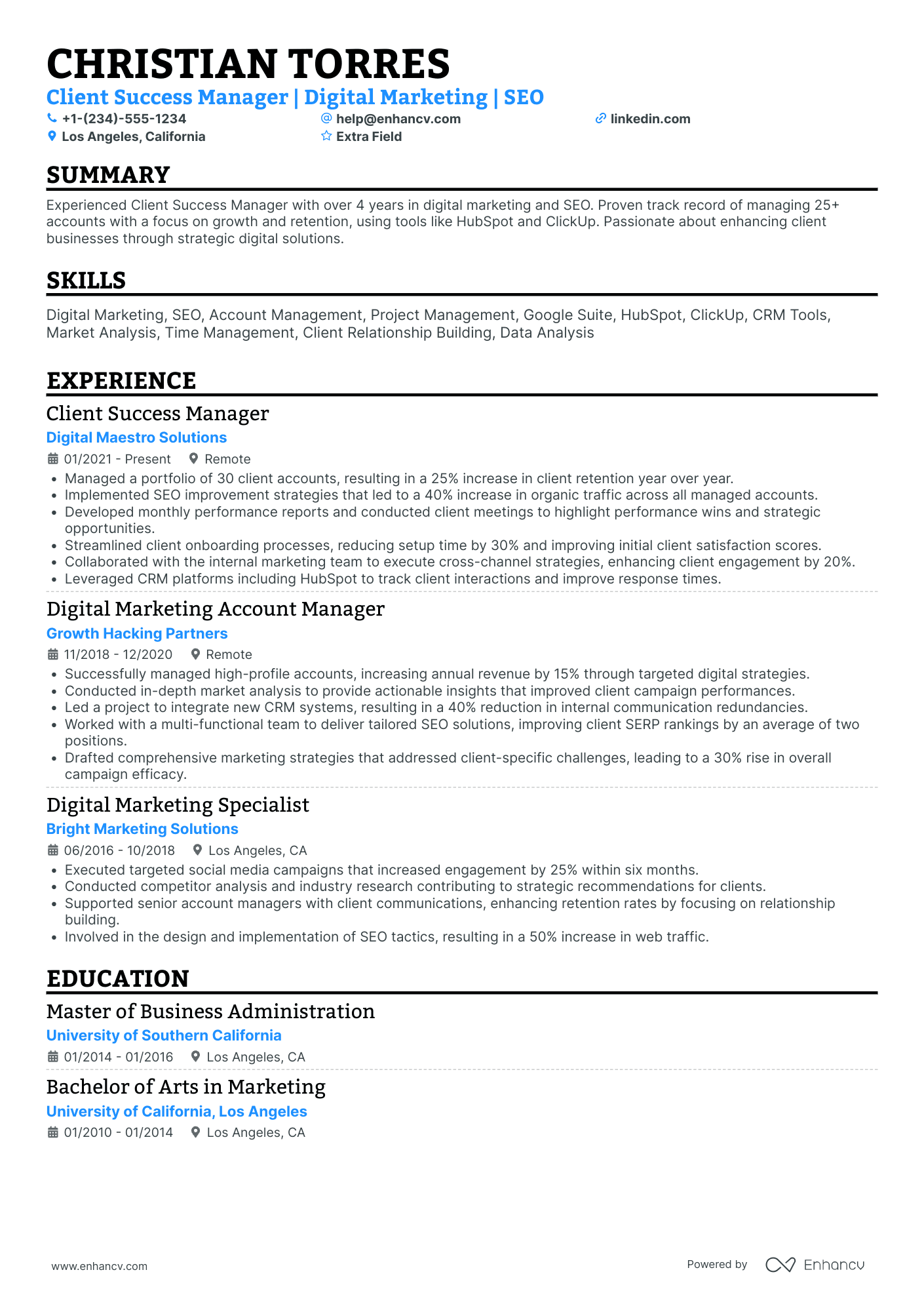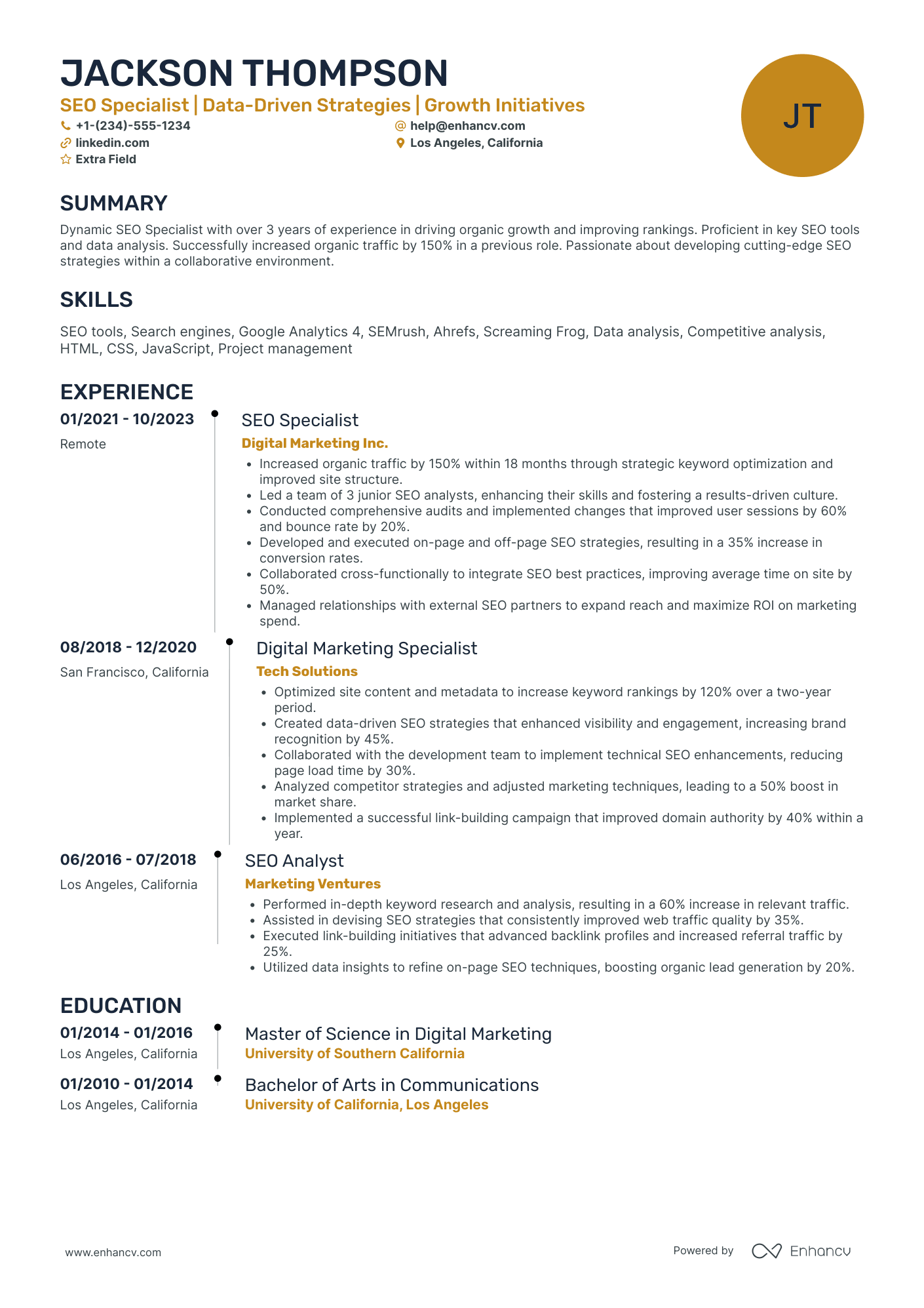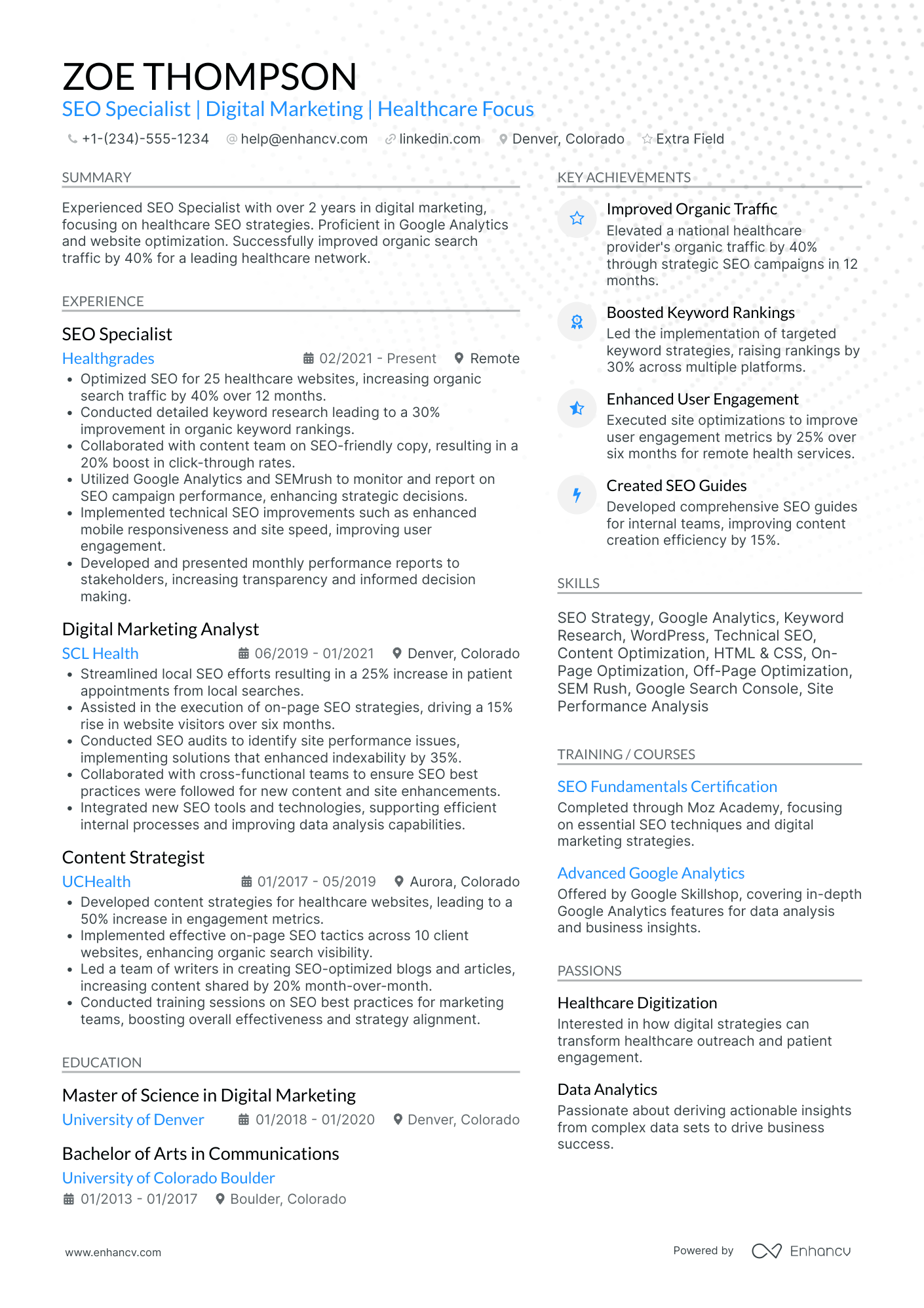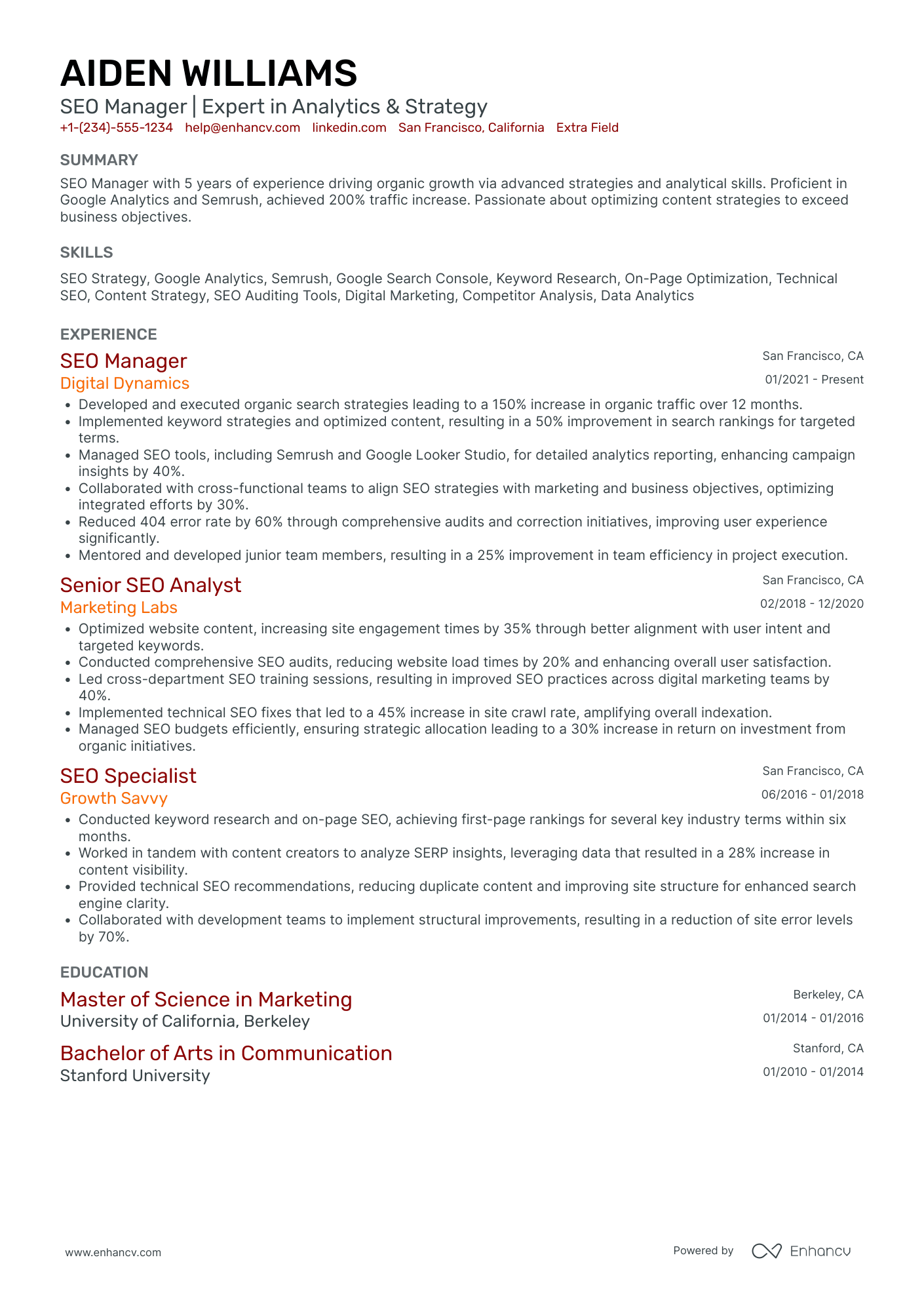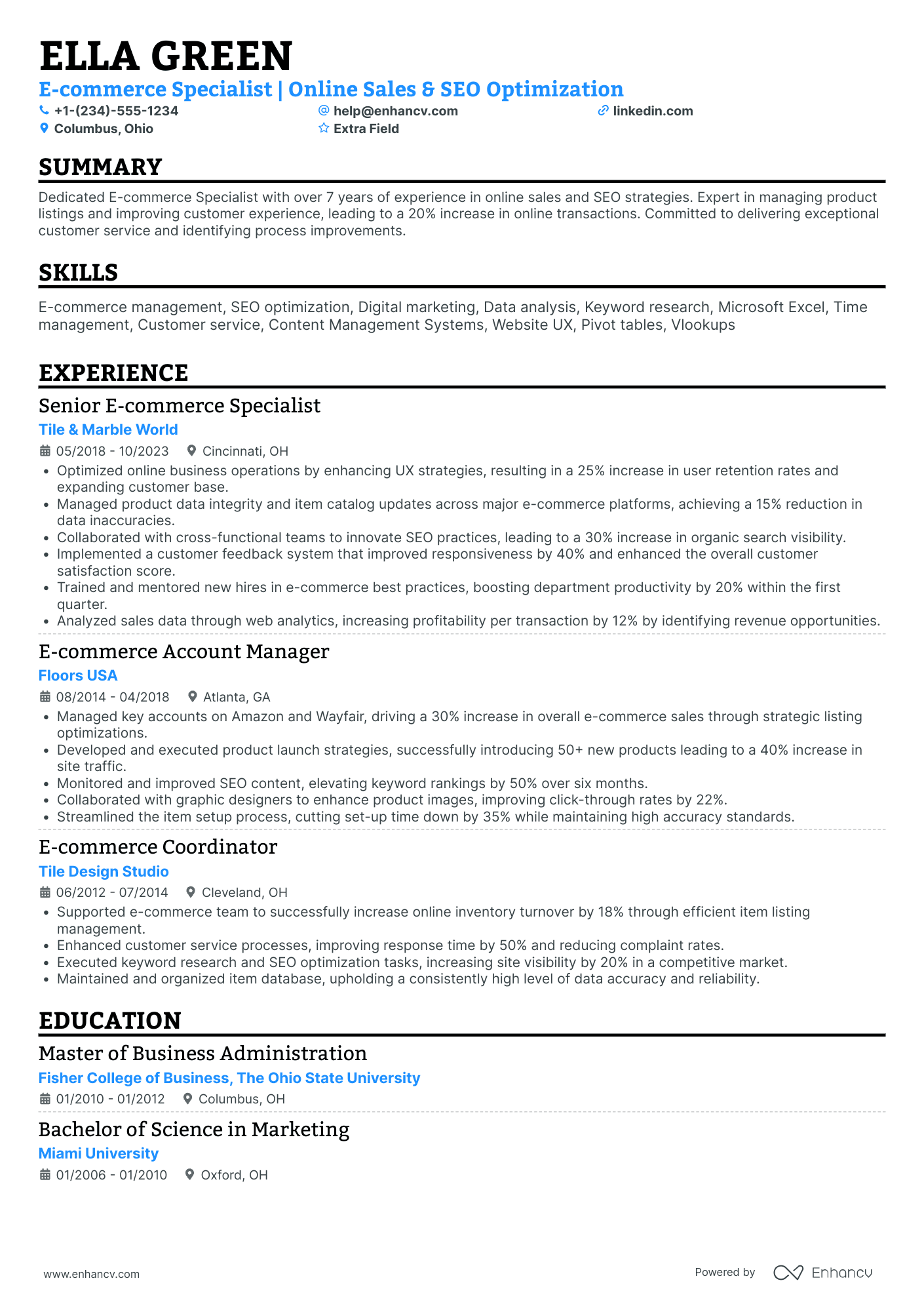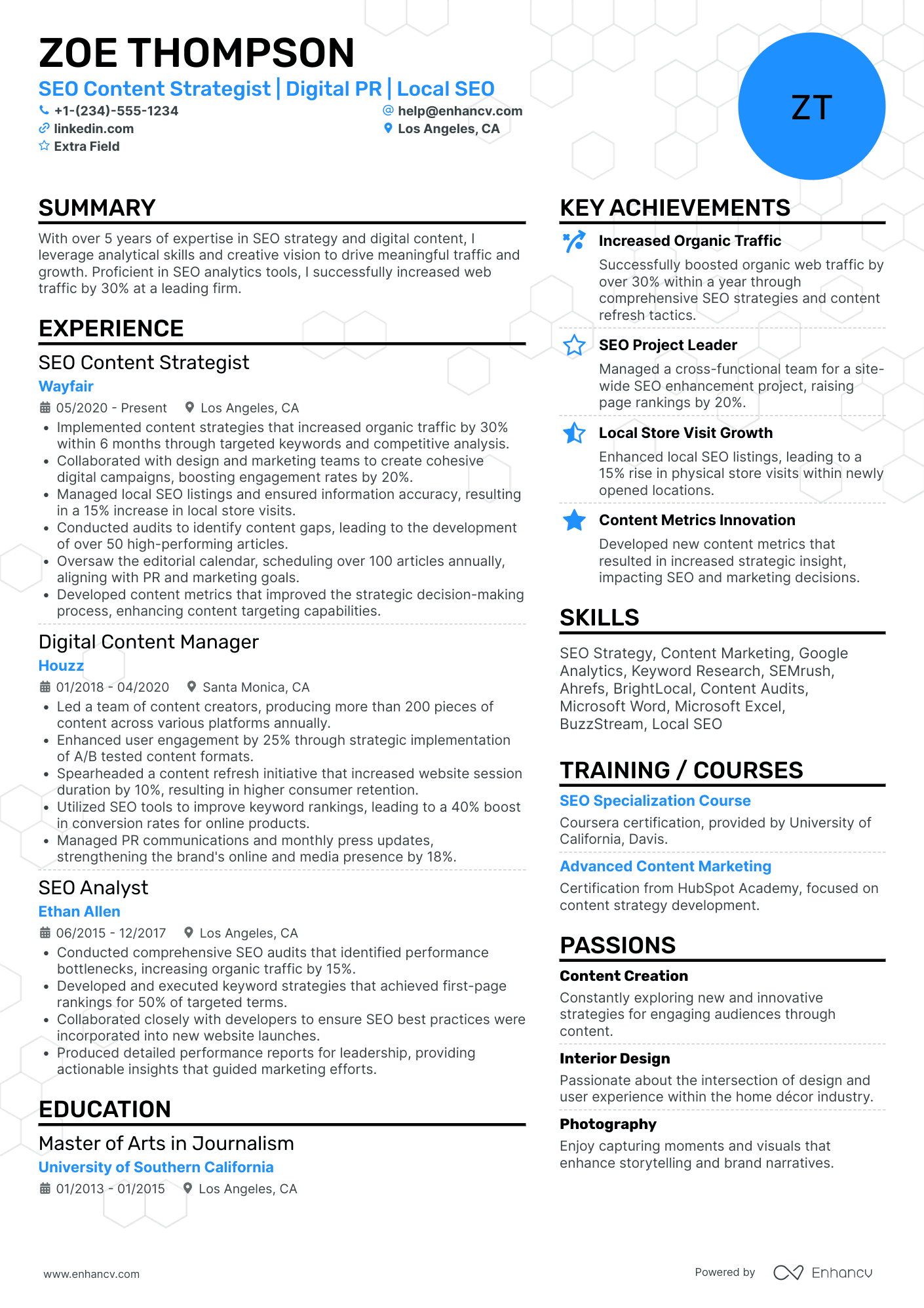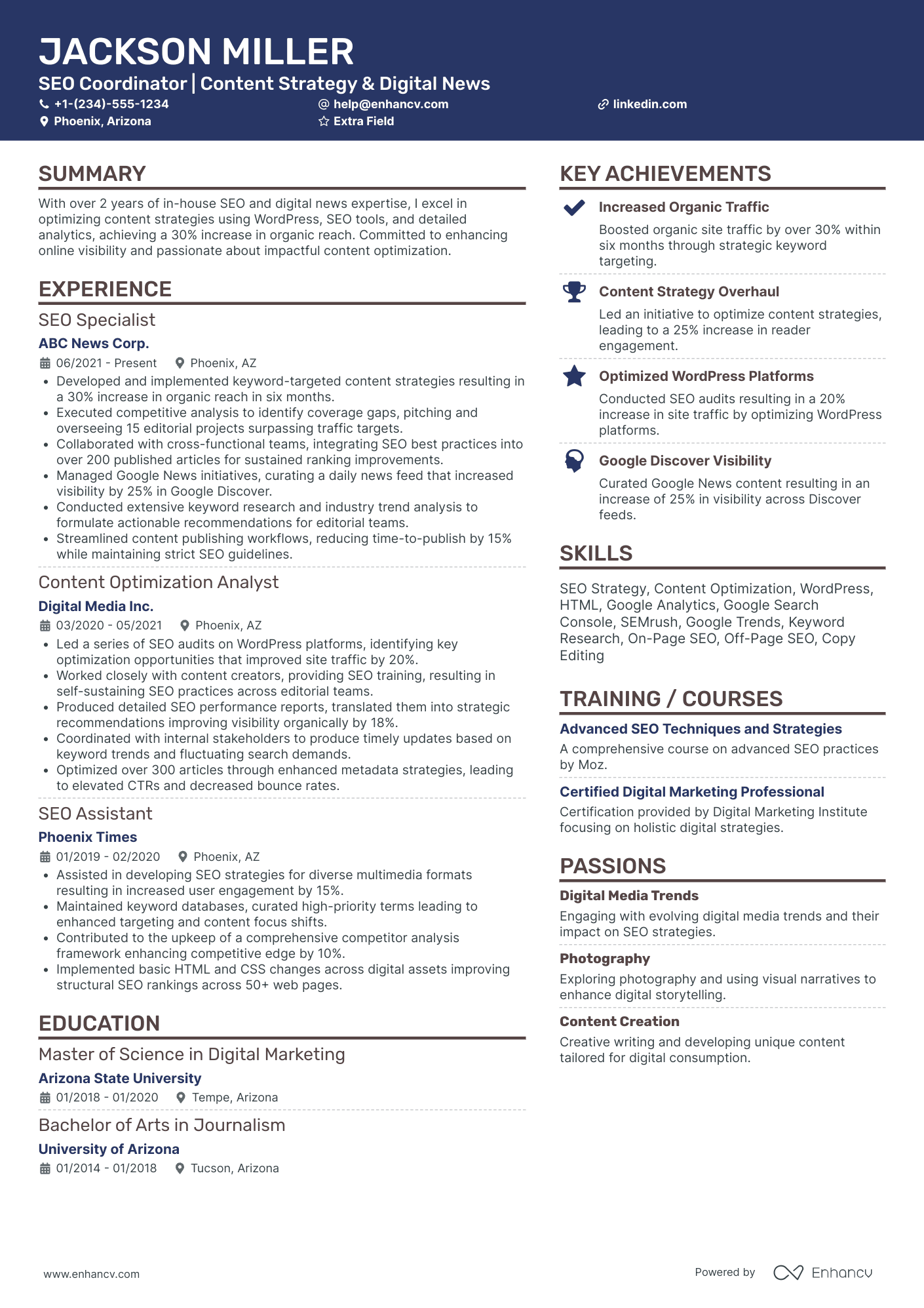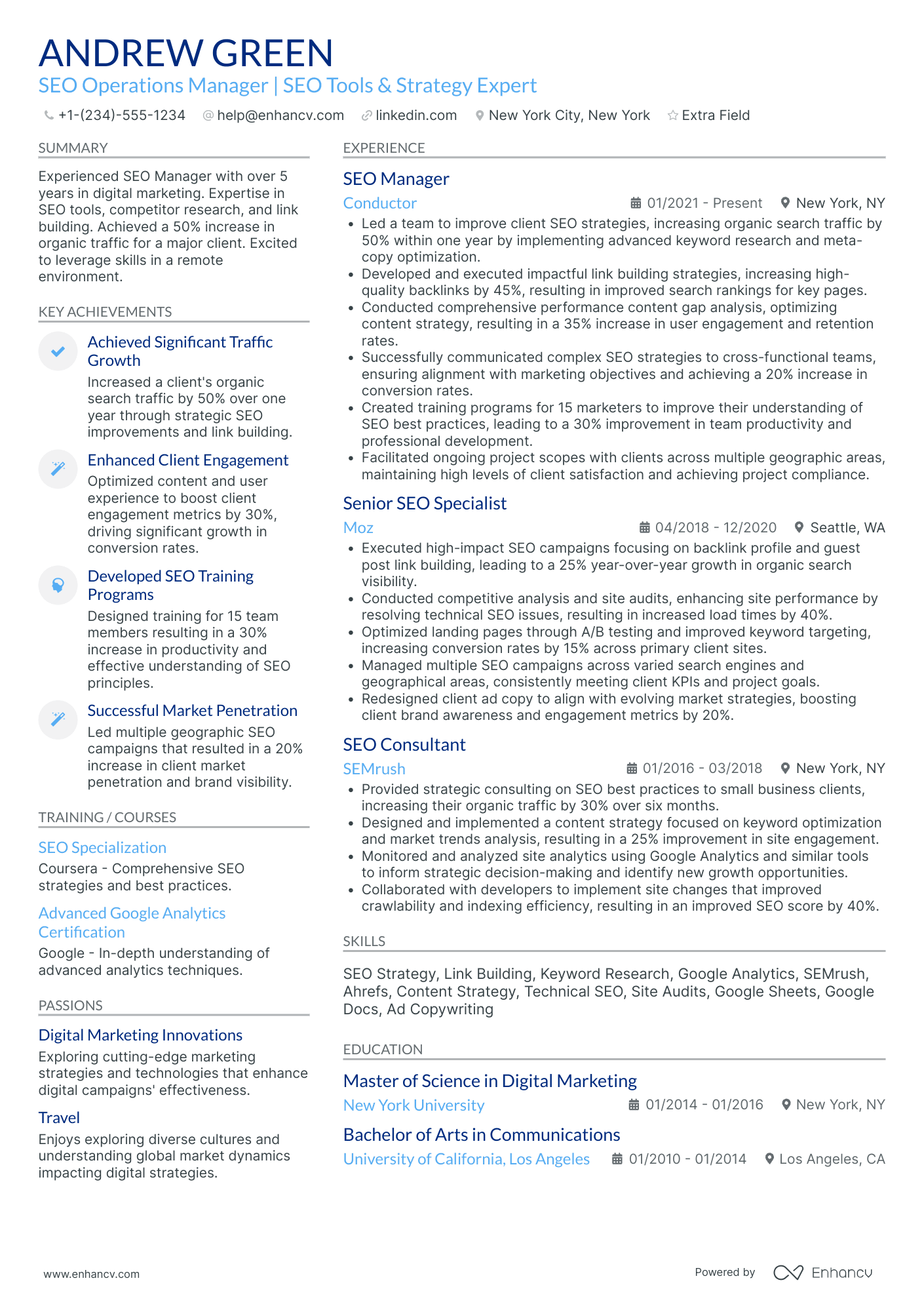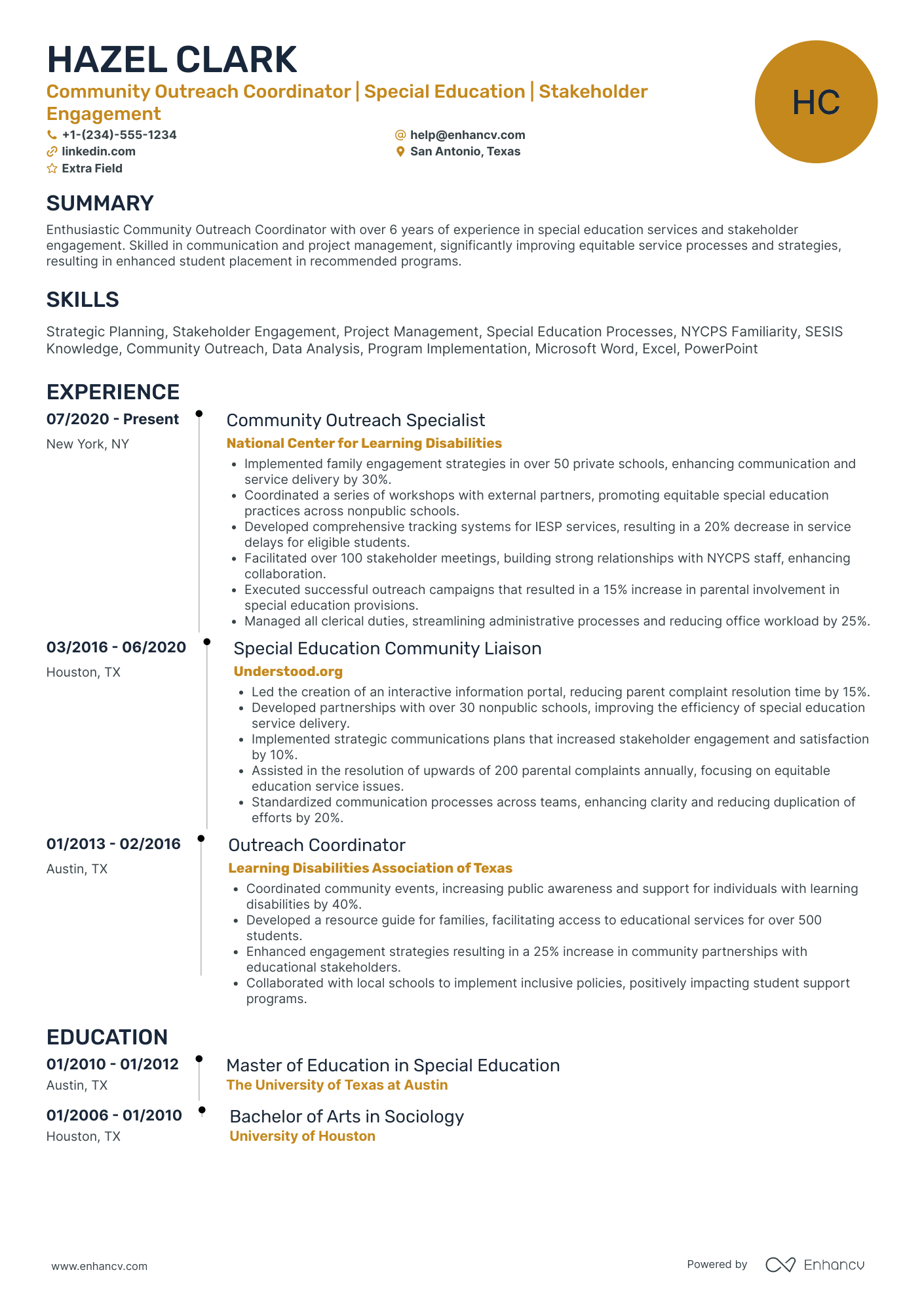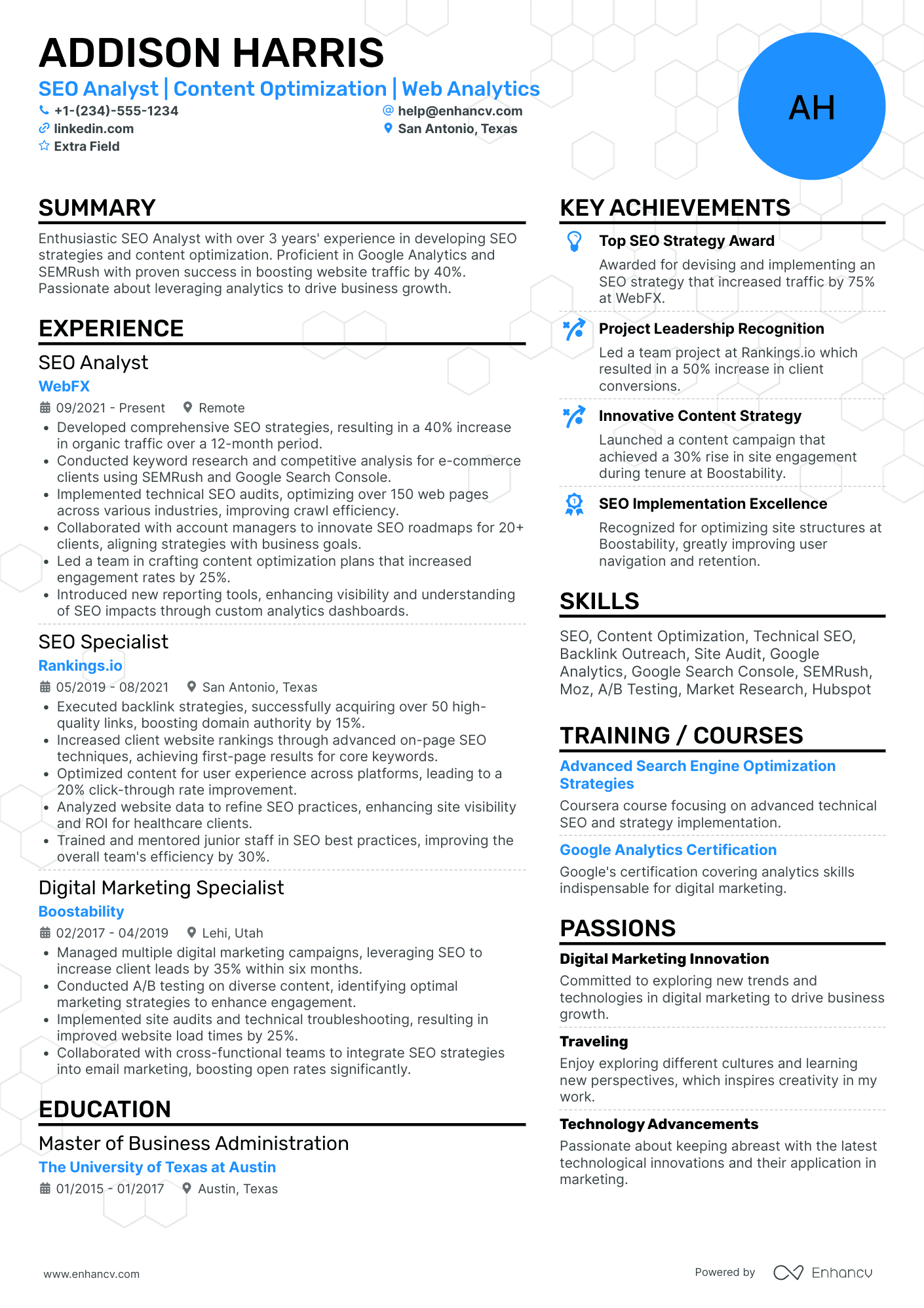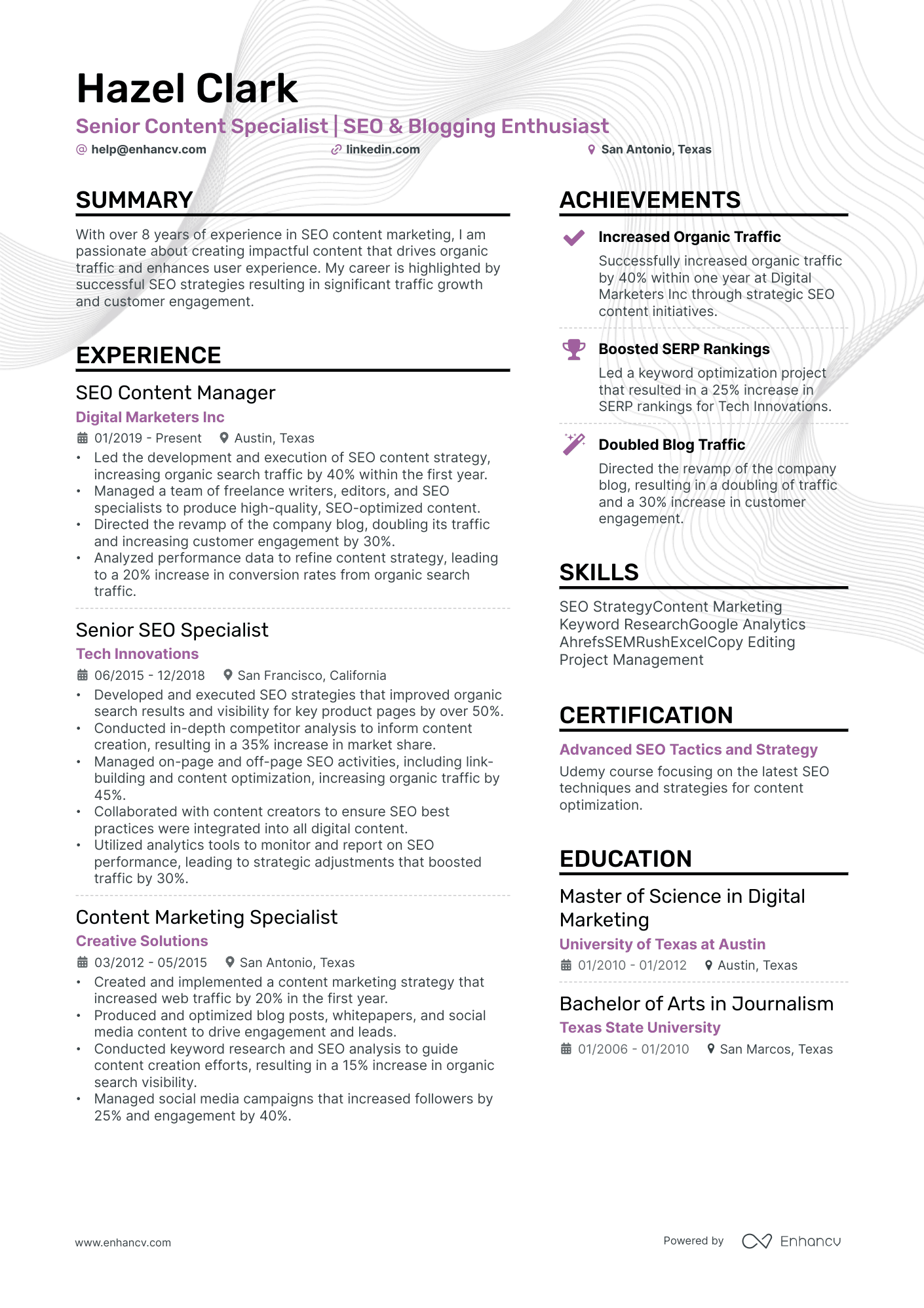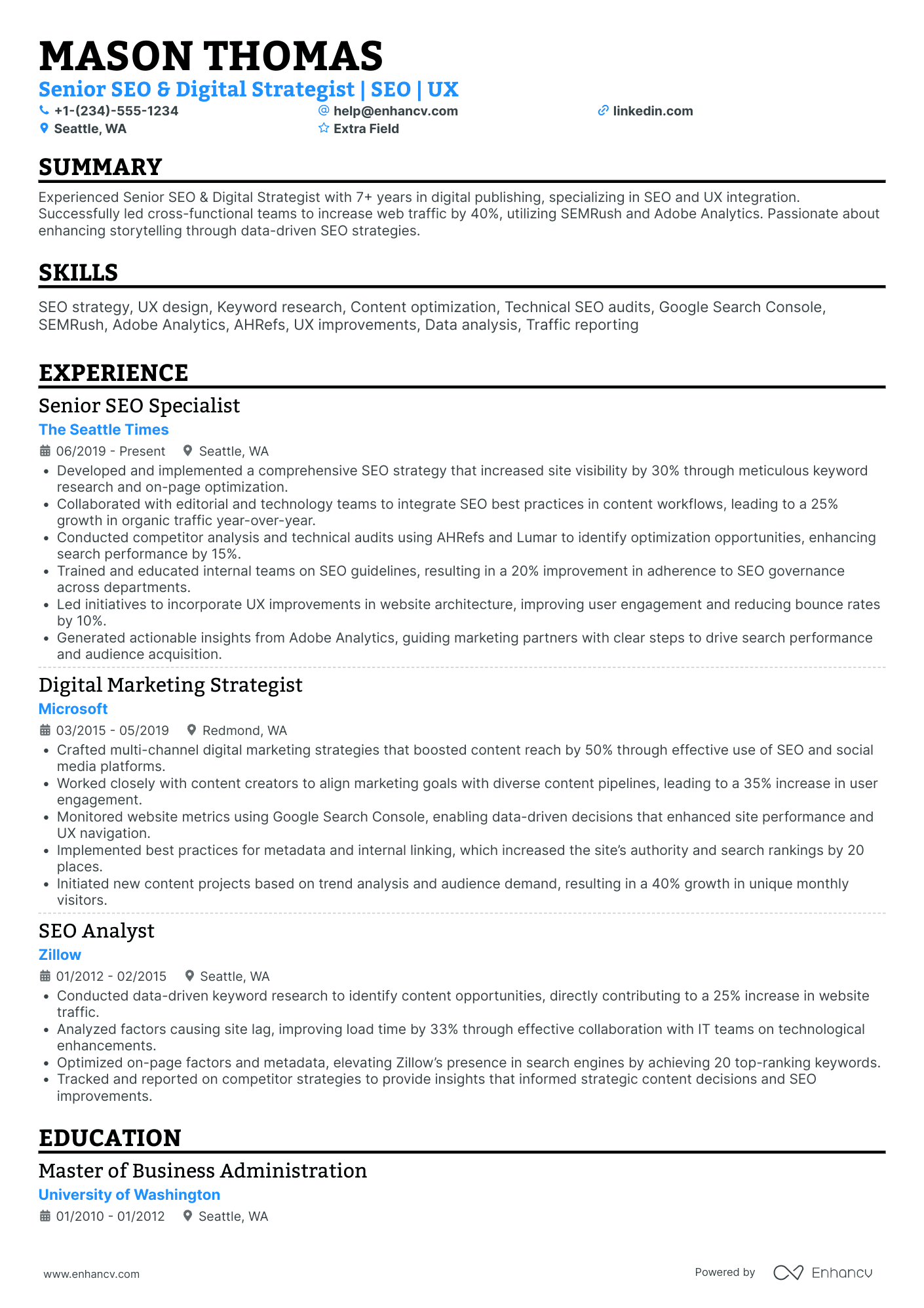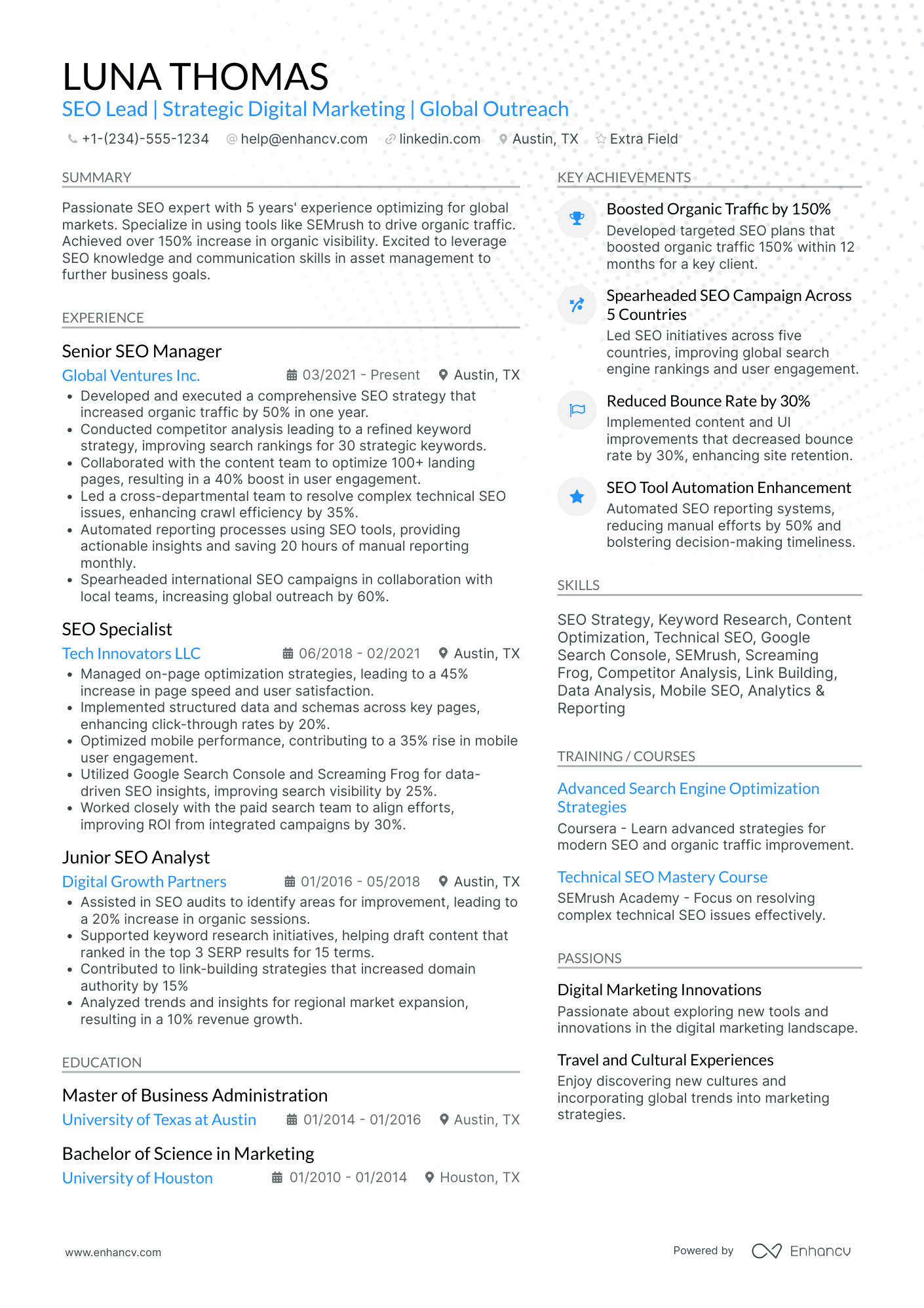As an expert in search engine optimization, you already know how to skyrocket a website to Google's top rankings. But will this be enough to land you a high-paying SEO job? Does your resume have what it takes to rank you number one in front of the recruiters?
Remember, this time you only have a few seconds to convert visitors into leads, so both your design and content must be flawless.
Let us be your Rand Fishkin for today and explain to you how to achieve a number-one SEO resume.
Here’s what this resume guide for SEO specialists will teach you:
- Which resume sections will give you a competitive advantage;
- Which resume layout suits your work experience and skills the most;
- How to customize the header and summary to grab the attention of recruiters;
- How to include facts and figures in the experience section to prove you’re a true expert;
- What additional certifications or projects will add value to your application.
Are you interested in more SEO and digital marketing resume examples? Have a look.
- Marketing resume examples;
- SEO Specialist resume examples;
- SEO Manager resume examples;
- Content Marketing resume examples.
- SEO cover letter
Here's our example of an SEO resume template. Use it as inspiration or adapt it for your personal use.
What is the best way to format an SEO resume
If you’re a seasoned search engine optimization specialist, use the reverse-chronological layout. It's ideal for showcasing your responsibilities and accomplishments across various projects or digital agencies.On the other hand, for newcomers to the SEO field or those engaged in freelance work, we recommend choosing between a hybrid or functional layout. They emphasize strengths and skills, rather than work history.
When it comes to using templates, marketers are often compelled to show their artistic flair. If that resonates with you, consider our creative template, which is simple, modern, and hip.
Here’s what else you should have in mind when building your SEO resume.
Resume design for search engine optimization specialists
- Leave 1-inch margins to increase readability and ensure there’s enough white space on the page. Anything less would clutter your resume.
- Use professional fonts to meet industry standards and pass the initial screening. Keep in mind that all traditional fonts, serif or sans serif, are ATS-friendly. Stick to font size 10-12 pt as it’s easier to read.
- If you want to add an artistic edge to your resume but are not sure how, go for a ready-to-use template. We have a huge range of resume templates to choose from, so you only need to focus on the content of your resume.
- Save your resume as a PDF file to make sure it can be opened and viewed on any device.
Nail your SEO resume header
Your resume header is similar to the title of a web page that appears on the search engine results page. Make it catchy and informative enough so the user clicks on it.
Just don’t use flashy buzzwords to click-bait the hiring managers. Everything you state in the header and summary sections should be backed up by your experience and accomplishments later on.
An effective header should be concise, feature a contrasting element (color, secondary font,) and include a headline that gives the reader an idea of your professional background.
For example, don’t just say SEO in the title. Instead, you can say “Result-driven SEO expert with UX and CRO expertise”. This instantly shapes you into a pro.
You can also tailor your header to the specific job — e-commerce, online gaming, fin-tech, SaaS, etc.
Finally, remember to put a link to your portfolio website with successful projects and case studies. If you don’t have one, then your LinkedIn profile might be a good alternative.
Below is a list of the other resume sections that we’ll walk you through in this guide:
Top sections on a search engine optimization resume
- Core SEO skills: Showcases your expertise in SEO strategies and tools for driving website traffic.
- SEO project experience: Highlights your hands-on experience with SEO campaigns, a must-have for practical knowledge.
- Technical SEO knowledge and certifications: Demonstrates your understanding of technical SEO aspects used for website optimization.
- Strong resume summary: Highlights your career objectives, skills, and standout qualities that add value to your profile.
- Achievements: Vital for measuring SEO outcomes and desire for personal growth.
And while building your resume, remember that recruiters will be looking for specific signs you’re the right fit for the SEO vacancy.
What recruiters want to see on your resume
- Proven track record in increasing organic traffic, as it directly impacts website visibility and business success.
- Expertise in keyword research and optimization to ensure the content matches user search intent.
- Strong skills in analytics and SEO tools to analyze performance and guide strategy adjustments.
- Experience in content strategy development to engage users and support SEO goals.
- Ability to execute effective link-building campaigns to enhance site authority and search rankings.
Already have a resume? Use the upload button below to check if there’s room for improvement.
Is your resume good enough?
Drop your resume here or choose a file. PDF & DOCX only. Max 2MB file size.
How to build an effective SEO experience section
Now, let’s move on to the most time-consuming section of your resume, the experience section.
Don’t make the most common mistake by only listing your responsibilities like a boring job description. Instead, highlight how you can create outstanding content with carefully selected keywords that bring organic traffic. Explain that you are a data junkie who makes website improvements based on thorough analysis. Include numbers and facts to show why you are a really good fit for that SEO position.
Let’s have a look at two examples — a good and a bad one — and analyze what makes an experience entry stand out.
- •Responsible for onsite and offsite SEO strategies.
- •Used Google Analytics to monitor website performance.
- •Improved keyword rankings.
- •Prepared client reports.
We can spot 3 missed opportunities here:
- No quantifiable results. The section doesn’t include any specific metrics or quantifiable outcomes, such as the percentage increase in organic traffic, specific improvements in keyword rankings (e.g., from page 3 to the top of page 1), or conversion rate improvements. These could have enhanced the perceived value of the work done.
- Vague descriptions of responsibilities and impact. The duties are too generic and don’t specify how they contributed to the business goals. The candidate could have provided more details on specific onsite and offsite SEO strategies used, or how the use of Google Analytics led to actionable insights and changes.
- Missing details on collaboration and innovation. Was it a one-man show? There's no mention of collaboration with other teams such as content creators, web developers, or digital marketing professionals.
With a few tweaks, this experience entry could turn into something way more effective.
- •Positioned website in a competitive niche at top 5 for 20+ high volume keywords.
- •Increased organic traffic with 43% and reduced bounce rate with 22%.
- •Created helpful content which gained 17 natural backlinks without any outreach campaigns.
- •Implemented JSON-LD structured data which led to a 51% increase in rich snippets results.
If the improved version addresses these same areas by adding specific results and more detailed role descriptions.
- Concrete evidence of success. The percentage increase in organic traffic or the exact improvements in keyword rankings both demonstrate the tangible impact of the candidate's work.
- SEO strategies and tools employed. The improved version elaborates on the specific onsite and offsite search engine optimization strategies used, as well as how tools like Google Analytics were used to drive decisions. This shows a deep understanding of SEO practices and the ability to leverage data for strategic advantage.
- Collaboration and innovation. Including information on how the candidate collaborated with other departments or introduced innovative SEO tactics highlights their ability to work in a team and their contribution to a culture of innovation. Note soft skills such as leadership and creative problem-solving abilities are implied, not explicitly mentioned.
The following section of this guide will show you different ways to provide evidence for success on your SEO resume.
How to quantify impact on your resume
Many factors can boost the impact of your resume. Include those anywhere you can to substantiate your experience entries.
- Include the percentage increase in organic traffic to show your ability to grow website visibility.
- Detail the specific improvement in SERP rankings for key target keywords, showing your direct impact on search visibility.
- Mention the conversion rate improvement from organic search traffic to highlight your strategies' effectiveness in driving business outcomes.
- Specify the reduction in bounce rate achieved through SEO optimizations.
- Report the number of high-quality backlinks acquired, showcasing your success in link-building and enhancing site authority.
- Quantify the growth in content output and its correlation with traffic increase.
- List the increase in pages indexed by search engines to reflect the quality of your content.
- Provide metrics on load time improvement for the website, showing your technical SEO skills in optimizing site performance.
Still, for first-time job-seekers, quantifying impact is more challenging because of the lack of hands-on experience. Let’s see what can be done to overcome that.
How to write an entry-level SEO resume
Do you want to start your career in SEO and digital marketing? Prove that you are Internet savvy by showing you have an active online presence. Do you maintain a personal blog? Are you helping a friend develop their Facebook page or listening to digital marketing podcasts in your free time?
All those hours spent on your computer may actually be in your favor.
To increase your chances of getting an interview call, pick any of the following suggestions that will help you get noticed, despite the lack of experience.
- Objective statement: 2-3 sentences highlighting your SEO interest, any relevant experience, and your career objectives. Recruiters should be able to see how your goals align with their business goals.
- Skills: List both hard and soft skills relevant to SEO, such as keyword research, content creation, Google Search Console, Google Analytics, teamwork, and communication. You might have gained those through training courses or academic work, the point is to highlight every skill that is relevant to the job you’re applying for.
- Education: Include your degree, major, and any relevant certifications (like Google Analytics certification) that are pertinent to SEO.
- Projects or portfolio: Have you done any freelance work that demonstrates your SEO knowledge and abilities? Be sure to highlight it together with the results achieved.
- Work experience: Even if not directly related to SEO, include past work experience that highlights transferable skills such as research, analysis, content writing, or technical skills.
And again, only list relevant skills and experiences. Making cappuccino at Starbucks is great but has nothing to do with SEO, so better keep it off the resume.
How to make sure your SEO resume skills stand out
Skills are fundamental for your SEO resume. The hiring managers will be eager to learn what you can bring to the table and why you’re the right fit for their position.
It’s important to list all SEO tools and software you can work with, together with the soft skills you have. Recruiters often use ATS to search for specific terms in the candidate’s resume.
SEO specialists are usually masters of numerous software, tools and Chrome plugins. List all these that apply to you but don’t overdo it. Keyword stuffing is not ok.
Don’t miss the opportunity to elaborate further on your soft skills. After all, your personal strengths might be the reason why you get an interview.
Best soft skills for your SEO resume
- Analytical thinking
- Continuous learning
- Problem-solving
- Adaptability
- Communication
- Attention to detail
- Strategic planning
- Collaboration
- Time management
- Curiosity
- Empathy
- Persuasion
- Patience
- Project management
- Initiative
- Negotiation
- Listening
- Critical thinking
- Leadership
- Resilience
Deciding which skills to highlight on your resume largely depends on the job description. Read it carefully and tailor your skills accordingly.
How to list certifications and education on your resume
SEO specialists come from various backgrounds. There’s not a single diploma that will secure you an SEO position.
However, you can still mention your higher education. Recruiters will be able to make an assumption of your skills based on the minor or major you have.
These are the most common degrees SEO experts have:
- Marketing;
- Advertising;
- Business Administration;
- Information Technologies;
- Broadcast Media Technologies;
- Telecommunications;
- Public Relations;
- Computer Information Systems;
- English.
The hiring managers want their SEO specialists to be passionate about learning. Thus, having an SEO-related certificate will be a good example of your motivation to expand your knowledge.
SEO is constantly changing so you have to stay up-to-date with the latest Google updates, marketing trends and social media tweaks. Any of the following will definitely come in handy when applying for an SEO-related job.
Best certifications for your SEO resume
- Google Analytics Individual Qualification (GAIQ)
- SEMrush SEO Certification
- HubSpot Content Marketing Certification
- Moz SEO Essentials Certificate
- Yoast SEO Certification
Now, onto writing the most powerful section of your resume, the summary.
Writing an exceptional SEO resume summary or objective
It’s often a good idea to craft your summary after completing all other sections. You’ll have enough freshly written content to draw from to produce those 3-5 sentences that encapsulate your career and motivations effectively.
Let’s explore these two examples and analyze what works well in a resume summary.
It’s obvious this is not really a resume summary. It’s short, generic and doesn’t provide any measurable outcomes.
A summary should span 3-5 sentences, highlighting the candidate’s most notable achievements. It has to start with job-specific keywords so capture the attention of both recruiters and applicant tracking systems.
Let’s see how different the above example can be after a few improvements.
Major difference, right?
First, the summary is rich in keywords “SEOexpert”, “Marketing”, “organictraffic”, “optimization” to name a few. Those indicate the candidate's profile will solidify their reputation as a knowledgeable professional in their field.
Second, the inclusion of a figure — “150%” — means that the SEO specialist is result-driven and their strategies are effective.
Third, there’s a mention of a small list of top SEO tools that are needed for the job. What’s more, the candidate couples that with additional certifications proving that they’re committed to continuous learning and staying ahead in their field.
Finally, the choice of words like “expertise”, “strong”, “impactful” naturally gives the impression that this is someone who can make significant contributions.
Note the use of first person singular. Even though it can sound like bragging if overdosed, here it works well as it adds to the candidate’s credibility and authenticity.
If you feel like after the summary you still have important information to add to your resume, read our advice on what else you can put on an SEO resume.
Optimize your resume summary and objective for ATS
Drop your resume here or choose a file.
PDF & DOCX only. Max 2MB file size.
Additional sections for a SEO resume
Let’s be clear. The more you add to your resume, the more likely you are to lose the recruiter’s interest. So above all, consider adding another section only if it adds value to your application. Be it awards or achievements, they should be relevant to the job you’re applying for and not just space fillers.
How to put a projects section on an SEO resume
For SEO specialists, incorporating a "Projects" section on your resume not only showcases your hands-on experience with search engines but also highlights your adaptability, particularly if you have experience across various industries.
Take, for example, if you've primarily focused on on-page optimization for B2C clients but also tackled a project for a B2B client. Including such projects is crucial as it introduces a fresh dimension to your capabilities and illustrates your versatile approach to SEO tasks.
When detailing a project, structure it as follows:
- Begin with the project's name.
- Include the project's duration, dates, and location, especially if it was conducted outside your usual area of operation.
- Describe your role in the project in one sentence, focusing on your key responsibilities.
- Conclude by detailing the impact of your work. Quantify your achievements, highlight any notable discoveries, and share the outcomes of your efforts.
This approach not only organizes your contributions, but also underlines the breadth of your experience and the value you bring to SEO projects.
Key takeaways
Crafting an SEO resume should come naturally to you. After all, you're a pro at using keywords and structuring content efficiently. Our goal is to assist you in further enhancing your resume by helping you to:
- Organize your skills and experience in a way that showcases your value to recruiters beyond what is explicitly stated.
- Quantify your accomplishments with concrete data that underscores your responsibilities.
- Select what to include in your resume and what to omit, ensuring every element serves a purpose.
- Incorporate additional sections when they effectively underscore your expertise and achievements in the SEO field.
SEO resume examples
By Experience
By Role
